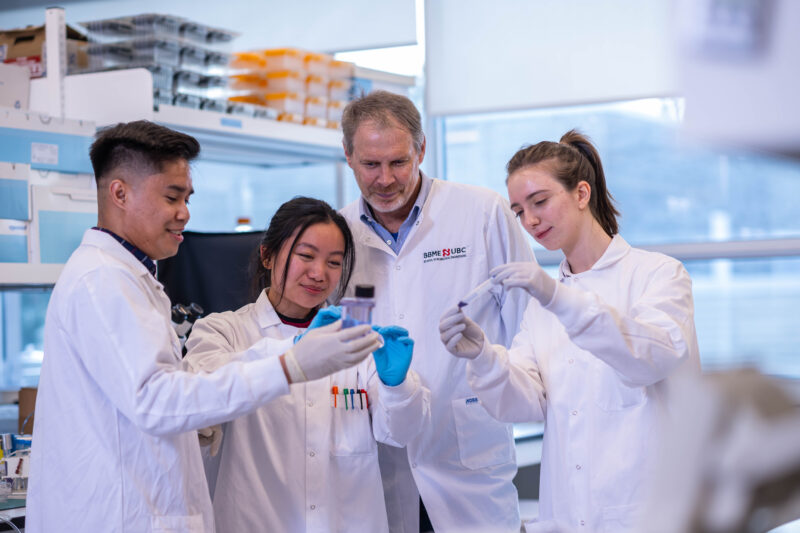Education and outreach
UBC team receives $1.65M to train a new generation of immunoengineers

An interdisciplinary UBC team led by Dr. Peter Zandstra has received $1.65 million in federal funding to train a new generation of immunoengineers to innovate, develop and deliver new immunoengineering technologies for commercialization.
The training program, dubbed ImmunoE, will help prepare graduate students and postdoctoral fellows for the workforce to meet the needs of B.C. and Canada’s expanding bioeconomy. The funding was announced today by the Natural Sciences and Engineering Research Council of Canada (NSERC) through the Collaborative Research and Training Experience (CREATE) program.
“The COVID-19 pandemic highlighted increasing demand for advanced biotechnologies and immunotherapeutics. ImmunoE will accelerate the biotechnology pipeline from research innovation to industry, and will train over 80 highly qualified personnel with industry-ready technical expertise, problem-solving and professional skills, ready for productive careers in the biotechnology industry and addressing the shortage of highly qualified personnel in the life sciences sector,” said Dr. Peter Zandstra, Director, School of Biomedical Engineering (SBME).
ImmunoE builds on an established network of interdisciplinary academic and industry life scientists and engineers with expertise in immunology, cell, molecular, and genetic engineering, and biotechnology that was developed under the UBC Immunotherapeutics Research Excellence Cluster and supports the work of Canada’s Immuno-Engineering and Biomanufacturing Hub.
Dr. Kelly McNagny, co-leader of the Immunotherapeutics Cluster with Dr. Pauline Johnson, two of the main drivers behind this grant, commented, “ImmunoE’s strength is linking the basic principles of immunology, engineering, genomics, and synthetic biology to develop novel, ‘outside of the box’ innovative technologies and products.”
The interdisciplinary team draws members from across UBC’s Faculties of Applied Science, Medicine and Science, with expertise in mechanical engineering, biochemistry and molecular biology, microbiology and immunology, medical genetics, and surgery. The team includes:
Immune cell engineering
- Peter Zandstra: Director, SBME and Professor, SBME and Michael Smith Laboratories
- Maria Tokuyama: Assistant Professor, Department of Microbiology and Immunology
- Hongshen Ma: Professor, Department of Mechanical Engineering
Nucleic acid engineering and immune targeting
- Pieter Cullis: Professor, Department of Biochemistry and Molecular Biology
- Anna Blakney: Assistant Professor, Michael Smith Laboratories and SBME
- Nozomu Yachie: Professor and Associate Research Director, SBME
Target identification and technology validation
- Kelly McNagny: Professor, SBME and Department of Medical Genetics
- Pauline Johnson: Professor, Department of Microbiology & Immunology
- Alice Mui: Associate Professor, Departments of Surgery and Biochemistry & Molecular Biology
Microbiome-engineered immune modulation
- Carolina Tropini: Assistant Professor, SBME and Department of Microbiology and Immunology
- Annie Ciernia: Assistant Professor, Department of Biochemistry and Molecular Biology
Collectively the team has a strong track record in developing new technologies and extraordinary research excellence with over 35 patents, 16 biotechnology companies, and over 300 publications, with $65M in research funds equipping them to train the new generation of immunoengineers.
The NSERC CREATE program is designed to improve the training environment for the next generation of Canadian researchers, fostering important skills in graduate students and postdoctoral fellows to improve their job readiness. For 2024, NSERC announced $26 million in support for a total of 16 CREATE training programs that will facilitate the transition of research trainees to the Canadian workforce while tackling crucial science and engineering challenges.
This story was originally published by the School of Biomedical Engineering.